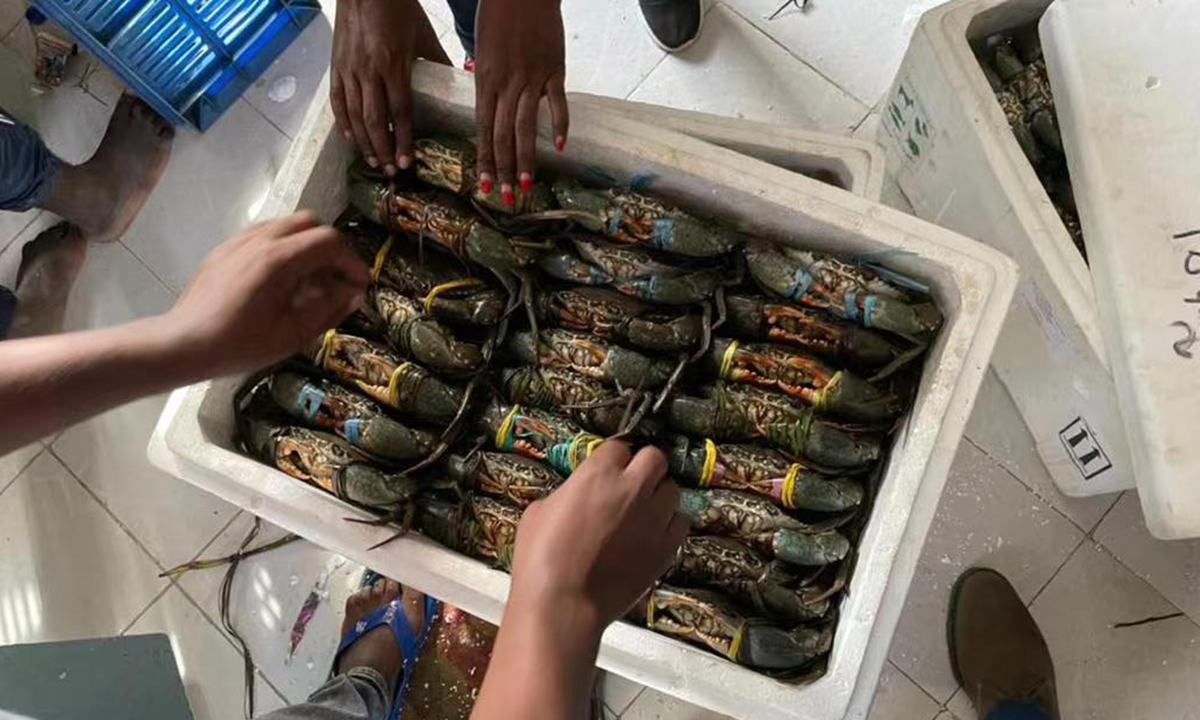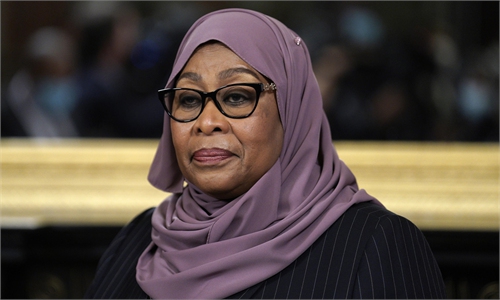
Tanzanian workers pack crabs for export to Shanghai. A shipment of 950kg of green crabs from Tanzania arrives in Shanghai on October 31, 2022, enjoying zero-tariff treatment. Photo: Courtesy of Shanghai Holdfresh Trading Co
A shipment of 950 kilograms of green crabs from Tanzania recently arrived in Shanghai. Under China's preferential policies for least-developed countries (LDCs), the crabs were imported duty-free, which helped reduce the importer's operating costs by 4,297 yuan ($587), the Global Times learned on Thursday.Tanzanian green crabs are increasingly popular in the Chinese market, as bilateral economic and trade ties continue to expand. In a further boost for bilateral cooperation, Tanzanian President Samia Suluhu Hassan arrived in Beijing on Wednesday for a state visit.
The crabs were imported by Shanghai Holdfresh Trading Co and arrived at Shanghai customs on Monday, Gao Hongtao, manager of the company, told the Global Times.
The company started importing crabs from Tanzania two years ago, and it could enjoy an import tax reduction from the original 7 percent to zero. In the first 10 months of the year, it imported 30 batches, recording a total of 82,300 yuan in tax cuts, Gao said.
From Dar es Salaam, capital of Tanzania, to Shanghai, it takes over 30 hours for a single trip by air and a transfer in Dubai or other cities.
"Despite the long distance, the crabs from Tanzania arrived here thanks to the high demand of the Chinese market and the preferential tax policies," Gao stressed.
Trade between China and Tanzania in the first nine months reached $6.01 billion, up 27.7 percent year-on-year, according to statistics from the General Administration of Customs of China (GAC).
The Tanzanian government only allows exports of green crabs with a weight of over 500 grams per crab, to protect resources and promote sustainable development, according to the Xinhua News Agency.
At present, there are only several cities in China that import Tanzanian green crabs, mainly supplying hotels and restaurants. With gradually improving marketing and logistics arrangements, it is expected that the crabs will enter the Chinese market on a large scale, Xinhua said.
According to the Shanghai customs, green crabs accounted for about one-third of Tanzanian exports to China this year. Specialty products from Tanzania such as sesame, green crab, sisal fiber and coffee beans have since 2013 enjoyed preferential tariff rates when entering the Chinese market, according to agreements between China and Tanzania.
Since the implementation of a special preferential tariff treatment policy in 2005, Shanghai customs has accepted a total of 73,400 preferential import customs declarations with a value of 23.87 billion yuan and a tax reduction of 2.34 billion yuan.
In order to facilitate the application of preferential trade measures, the GAC launched a system for Certificates of Origin (COs) of preferential tariff treatment, through which Chinese embassies and consulates stationed in the relevant countries can use blank COs for relevant export enterprises to raise efficiency.
China has continuously increased its trade support to LDCs on the UN list. So far, many items from more than 40 LDCs have enjoyed zero-tariff treatment when entering the Chinese market.



